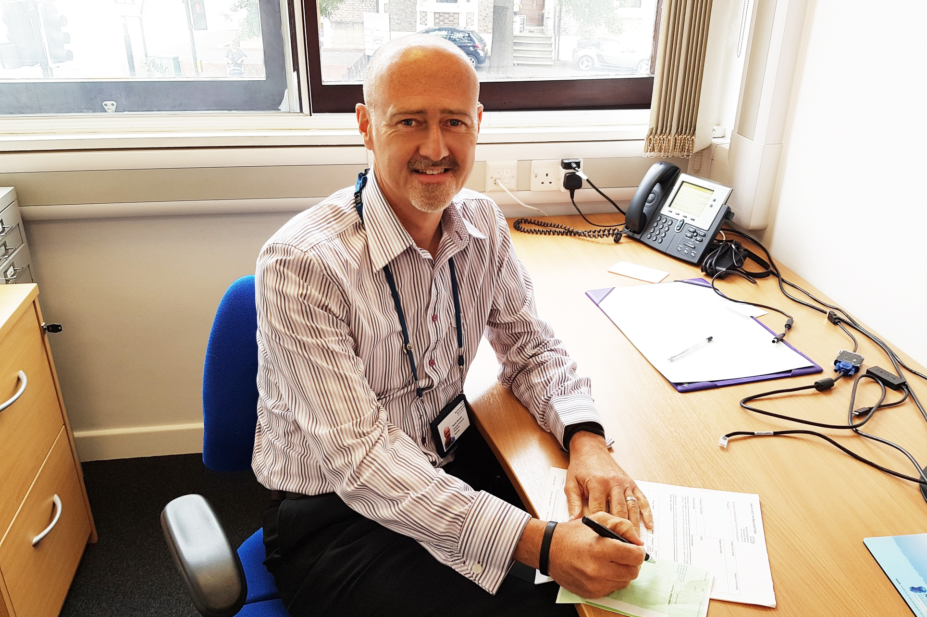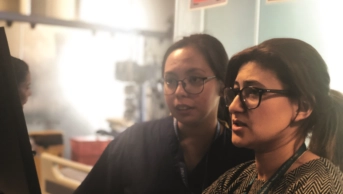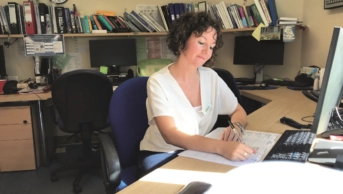
Courtesy of David Gerrard
In 2016, I was invited to join a community treatment team in Sunderland, Tyne and Wear, which provides care for vulnerable people with a learning disability, autism or both, who may also have mental health issues, physical ill-health or behaviour thought to be challenging.
It has been suggested that people should be cared for in the community, rather than in long-stay NHS hospital wards or private sector institutions. Against a backdrop of vacant consultant psychiatrist posts, and as part of developing a more robust community service, I was asked to utilise my prescribing qualification to manage a caseload of people and add a different skill mix to the team by providing pharmaceutical services — a new development for the wider multi-professional team and myself.
Part of my role focuses on the ‘STOMP’ agenda, which stands for stopping over-medication of people with a learning disability, autism or both with psychotropic medicines.
8:30 — start
I review my clinical appointments for the day and receive background information for each client from the administration team. I spend a few minutes with each nurse on the team, which supports my client reviews and ensures we have an update on each individual before meeting them. This gives me focus and some indication of what to ask during the interview. It also allows me to review previous appointments and any relevant changes to medicines or recent test results.
I am always supported by a nurse who knows the client well. We work to understand their current presentation and their needs, as well as the ongoing work of the wider team, which includes occupational therapists, speech and language therapists and physiotherapists. Our team is a true demonstration of a multidisciplinary team delivering holistic care for the people we look after.
9:00
We see three clients with their family members and/or carers. My first appointment is with a person diagnosed with paranoid schizophrenia, where I review their ongoing clozapine prescription.
The second appointment is a STOMP review. On this occasion, I reduce the client’s dose of risperidone, which was originally prescribed to manage challenging behaviour. The third appointment is with a young person with a diagnosis of attention deficit hyperactivity disorder who is transitioning from children’s to adult services.
I try to make meaningful interventions to improve the life of each person, their carers and family
Each one-hour appointment allows me to fully explore the opinions of the client, their carers and family, and carry out side-effect monitoring of their medicines and mental health state assessments. After listening, I gather my thoughts and talk through various options for intervention, including medicines and other elements of care.
I strive to deliver shared decision making with the client and their carers before we agree the final care plan, and provide relevant explanations in relation to any medication changes.
After each appointment, I dictate a letter for the client and their GP. I also update the clinical records system documenting my formulation, risk assessment, medication changes and mental state assessment. It can take time but, with practice and excellent support, it becomes easier.
I try to make meaningful interventions to improve the life of each person, their carers and family. Each review is unique with different areas of emphasis. They are, nonetheless, challenging and rewarding in equal measure.
12:00
I move straight into clinical supervision with the consultant psychiatrist. This is a vital and very supportive part of the role where I talk through the clients I am looking after and share my thoughts for their ongoing care. It is a session focused on challenging and supporting my ideas with additional input from an experienced psychiatrist. Without this support, I don’t believe I could work safely and effectively.
I have regular clinical supervision with the team psychologist where I can talk through my feelings about the role
I also have regular clinical supervision with the team psychologist where I can talk through my feelings about the role. I initially overlooked this aspect, but have since benefited tremendously from the additional level of support that I receive. I believe that with this supervision in place, I am confident and competent to carry out my duties and deliver safe and effective care for this vulnerable client group.
My job is by far the most rewarding role I have undertaken in my career to date. However, it comes with a health warning common to all pharmacist prescribers — to ensure that our practise is safe and that we can manage risk effectively. I have had clients threatening to take their lives during an appointment, clients who have become unsettled and later caused serious injury to themselves and others, and clients who have experienced abuse and victimisation by others. Anyone would be affected by these events and I have had many sleepless nights ruminating on these conversations. My regular discussions with the consultant psychologist help safeguard my own mental health.
14:00
I have two home visits organised to see clients who happen to live in the same care setting. They are both undergoing STOMP medication reviews. Domiciliary visits such as these are an essential part of my role, especially for clients who have anxiety about visiting hospitals. They also allow me to have a better understanding of the client’s home setting.
These reviews are more focused and relaxed, which can lead to better decision making. Most clients and care teams appreciate the fact that I am prepared to travel to them, rather than expecting the reverse.
15:00–17:00
The day finishes with one of the highlights of my role: meeting with client self-advocates. These are people with a learning disability or autism who act as a ‘confirm and challenge’ group for our service.
Today, I am visiting Sunderland People First, a community interest company which improves the lives of people with learning disabilities and autism. I present my role and talk through their hopes and expectations of medication reviews and challenges to care. I also run an education session for the self-advocates about medication and the wider STOMP agenda.
Many self-advocates are unaware of the role that a pharmacist can play and several have stories of care that is well below what could be considered acceptable. Listening and working with them reminds me why I first wanted to work in learning disability services.
Developing services in partnership with service users, rather than on behalf of them, is of paramount importance to doing the job well. It is humbling to be part of such work and to meet such amazing people.
Box: If you would like to consider a similar role, please consider the following:
- Have a passion and special interest in the sphere of practice in which you want to work;
- Develop your personal resilience — this requires reflection, time and effort;
- Build your support network — both clinical and pastoral;
- Identify your level of confidence and competence — work cautiously at first as you develop your expertise;
- Be prepared to demonstrate your worth and engage with people to share your vision, starting with those who will benefit most from your work — your patients.
Remember, pharmacists are health professionals in our own right. We are not doctors, nor do we seek to take from their role. We can, however, demonstrate safe and effective practice — releasing medical time, while delivering a unique, person-centred and collaborative service that delivers meaningful change in the lives of our patients.


